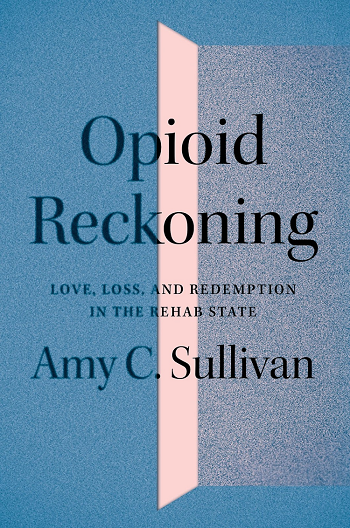Fall 2022 Colloquium
Lectures begin at 3:35pm in 125 Nicholson Hall on the East Bank of the University of Minnesota-Twin Cities campus.
At this time, all events will be in-person unless otherwise stated. Some events may be subject to change. Please check back for updates or contact hstm@umn.edu for more information.
To learn more about MCPS sponsored lectures, please visit their website.
Earlier Colloquium
Amy Sullivan, September 16, 3:35 pm

Department of History, Macalester College
Title: Narrative Interventions: Reckoning with Opioids in the Land of 10,000 Rehabs
Abstract: Professor Amy Sullivan (Macalester College) will discuss the background and oral history methodology of her book, Opioid Reckoning: Love, Loss, and Redemption in the Rehab State (University of Minnesota Press, 2021). Situated as we are in the state that founded “rehab” and launched a Twelve Step revolution, she will discuss how she came to see the fifty-plus oral history narratives she conducted as possible "interventions" on the persistence and trauma of the opioid epidemic, on entrenched stigma against drug users, on the fallacies of criminal justice drug reforms, and the growing acceptance of the once-derided harm reduction model.
Evelyn Brister, September 23, 3:35 pm
Rochester Institute of Technology

MCPS Lecture
Title: Interdisciplinary Integration as “Coordinated and Unified Action”
Abstract: There is a fundamental paradox in interdisciplinary research: while aiming to tear down the epistemic and
linguistic barriers between disciplines it also leads to increasingly specialized knowledge. Scientific research and
training institutions are set up so that knowledge grows toward greater specialization. Often, what starts as
interdisciplinary research becomes a discipline in its own right. And yet, the downsides to scientific specialization
have long been recognized. Otto Neurath’s anti-reductionist approach to unified science illuminates contemporary
hurdles to interdisciplinarity—and, in particular, to research that draws on disparate fields, such as from natural and
social sciences. I argue that we should conceptualize interdisciplinary integration as aiming, in Neurath’s words, at
“coordinated and unified action” and that the predominant metric of interdisciplinary integration fails to show
whether this epistemic goal has been achieved.
Emily Merchant, September 30, 3:35 pm
Science and Technology Studies, University of California – Davis

Title: Demographic Data and Global Population Control
Abstract: In the twentieth century, population growth became an object of intervention for governments, intergovernmental agencies, and nongovernmental organizations worldwide. Histories of population control typically assume that these interventions arose in response to evidence of rapid population growth. However, demographic data were sparse to nonexistent in many parts of the world during the decades immediately following World War II. This talk examines efforts by the United Nations to facilitate the collection and analysis of population data in all of its member states, and explores how the failure of those efforts created opportunities for U.S.-based philanthropies, and eventually the U.S. government, to promote population control programs throughout the Global South.
Matthew Stanley, October 7, 3:35 pm
Gallatin School of Individualized Study, NYU

Title: “Choose your own apocalypse: nuclear war, asteroids, and predicting the end of the world”
Abstract: Astronomers are good at predictions – eclipses down to the second, spacecraft landings to the minute. But in the 1980s they struggled with convincing their colleagues, politicians, and publics to take one of their predictions seriously at all. This was their novel warning that the Earth was in danger of being struck by an asteroid like that which killed the dinosaurs. What they saw as straightforward technical calculations turned out to be deeply entangled with the way late Cold War America thought about apocalypses in general, and the threat of nuclear war in particular. The scientists involved found that galvanizing political and social action required developing a new set of skills and networks that took advantage of the apocalyptic infrastructure that had been emplaced by decades of nuclear threat.
Jennifer Jhun, October 21, 3:35 pm
Duke University

MCPS Lecture
Title: Markets and Demarcation
Abstract: How does one delineate a system of interest? Here I consider categories such as market, which pick out
systems that we might wish to intervene on. I propose that kinds of this sort have a distinctive epistemic role to play
that has been underappreciated in the extant literature. They partake in demarcating systems of interest, enabling us
to effectively draw boundaries around relevant domains of inquiry. Insofar as this role is concerned, such categories
must be treated as functional kinds. So the membership condition for a member is whether or not it fits a particular
functional profile, articulated in terms of the counterfactual features it would exhibit under changes. Moreover, I
suggest that this activity is presupposed by, but in important ways conceptually distinct from, mechanistic reasoning
(as conceived by New Mechanists).
CANCELED: William Deringer, October 28, 3:35 pm
Science, Technology, and Society, MIT

Title: Hazardous Nature: Coalmining Engineers, Discounting Calculations, and the Price of Risk, c. 1800
Abstract: Coal has long played a starring role in historical explanations of the development of industrial capitalism and the dawning of the Anthropocene. Yet the contributions of the coal industry to the intellectual infrastructure of modern capitalism has gained far less attention. This presentation reconstructs the role that coalmining practitioners played in developing one of the foundational conceptual practices of modern economic life: the ability to put a price on things, particularly things with an uncertain future. In the years around 1800, the engineers—called “viewers”—tasked with managing mines in the rich coalfields of northeast England developed remarkably sophisticated mathematical techniques for the valuation of unmined deposits of coal. Combining geological data, engineering know-how, and market intelligence, colliery engineers reimagined subterranean seams of carbon-laden rock as orderly financial assets that could be projected to produce a flow of regular profits. The linchpin of these remarkably modern business models was a calculative technique called “exponential discounting,” which made it possible to assign a “present value” to expected future income using the logic of compound interest. (This paper is drawn from a larger book project on the history of these discounting calculations.) Viewers’ transfiguration of the earth’s products into profit-generating assets marked a key turning-point in the intellectual genealogy of the carbon economy. It also exemplified a critical development in modern ideas and technologies of risk. Colliery viewers found that adjusting just one parameter in their calculations, the “discount rate,” enabled them to adjust for the myriad financial risks that faced investors given the “precarious and hazardous nature of a Colliery property.” At the same time, this clever computational device effaced the very different kinds of risks—noxious gases, mine collapses, catastrophic explosions—that shaped, threatened, and frequently ended the lives of those workers who descended into the mines.
Suman Seth, November 4, 3:35 pm
Science and Technology Studies, Cornell University

Title: Problems in the Pluriverse: Postcolonial and Indigenous Science and Technology Studies
Abstract: In this talk I will explore one of the most interesting current areas of overlap between Postcolonial and Indigenous STS: a shared concern with the problems posed and the opportunities offered by relativizing ontologies. The central issue may be explained quite simply. Imagine a disagreement between two groups. One explains a given event—the shaking of the earth, perhaps—by invoking the action of some Gods; the other insists on a ‘scientific’ explanation, pointing to the coming together of tectonic plates. Were we, as analysts, to adopt an epistemologically relativist position on this disagreement, we might suggest that both groups were really ‘talking about the same thing.’ That they, in fact, were simply offering competing representations of truths—beliefs—about the world. Such a position insists that only one world exists, however many understandings of that world there may be. As an alternative, scholars in both postcolonial and Indigenous STS have proposed that it is the ontological and not the epistemological that needs to be relativized: that the problem lies in assuming that ‘we’ all share a single world. Instead of a universe, some have argued, we inhabit a pluriverse. Is the pluriverse a solution, however, or does it pose its own set of problems, both practical and political?
Nora Boyd, December 9, 3:35 pm
Philosophy, Siena College

MCPS Lecture
Title: Calibrating Cosmic Dawn Instruments
Abstract: This talk explores the epistemology of empirical science in a difficult epistemic context: the study of the
‘cosmic dawn’ via the faint signal from neutral hydrogen during the birth of the first stars in our universe.
Calibration plays a crucial epistemic role in that it truncates the ‘experimenters’ regress’. Especially when
investigating new phenomena, scientists often rely on surrogate signals to calibrate their instruments and thereby
help justify their results. I evaluate a Bayesian proposal in cosmic dawn research to largely sidestep surrogates and
lump calibration parameters together with other unknowns, thereby apparently erasing the distinctive epistemic role
of calibration.